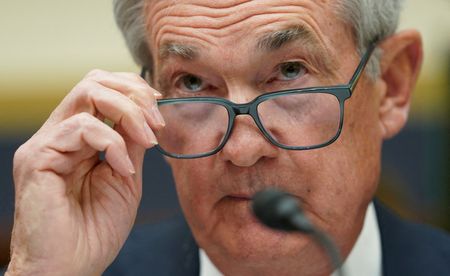
By Jamie McGeever
(Reuters) – A look at the day ahead in Asian markets from Jamie McGeever.
Asian markets are likely to remain under pressure on Thursday, particularly regional currencies, as investors grapple with a stubbornly high dollar and U.S. bond yields following a second round of Congressional testimony from Fed chief Jerome Powell.
Chinese inflation, revised Japanese GDP and an interest rate decision from Malaysia are the main events on the economic calendar, against a backdrop of increasingly frosty U.S.-Chinese relations that continue hang like a cloud over Asian markets.
Unsurprisingly, Asian markets slumped on Wednesday following the surge in U.S. yields, implied rates and the dollar. MSCI’s Asia ex-Japan index fell 1.5%, Hong Kong stocks fell more than 2% and the Hang Seng Tech index fell more than 3%.
Asian currencies are very much on the defensive against a rampant dollar. Malaysia’s ringgit fell more than 1% to its lowest level since November, while the South Korean won lost almost 2% of its value for its worst day in a month.
The ringgit will be under the spotlight again on Thursday, with Malaysia’s central bank expected to keep interest rates unchanged at 2.75% before delivering one last hike in the next quarter to at least 3.00%, according to a Reuters poll.
Bank Negara Malaysia surprised markets in January by keeping its benchmark rate unchanged. But given the Fed’s hawkish zeal and the dollar’s upward momentum, could policymakers be tempted to act now?
In China, surprisingly weak trade figures this week indicated that the economic reopening from years of strict COVID-19 restrictions is not flourishing as quickly as analysts – and more importantly, Chinese officials – had anticipated.
Consumer and producer price inflation figures for February will be released on Thursday, offering an insight into the strength of demand across all sectors of the economy.
The annual rate of producer price deflation is expected to accelerate, while the pace of monthly and annual consumer inflation is seen slowing, according to a Reuters poll.
The potential for conflict between China and the U.S. appears to be inching up on a near daily basis too. The latest diplomatic salvo came on Wednesday, with Beijing saying it is “seriously concerned” by Taiwan President Tsai Ing-wen’s “transit” plans amid reports she will meet U.S. House Speaker Kevin McCarthy in the United States.
U.S. intelligence agency leaders, meanwhile, say they expect China to deepen its diplomatic, defense, economic and technology cooperation with Russia, to continue trying to challenge the United States on all these fronts.
Here are three key developments that could provide more direction to markets on Thursday:
– China CPI and PPI inflation (February)
– Malaysia interest rate decision
– Japan GDP (Q4, revised)
(By Jamie McGeever; Editing by Josie Kao)

